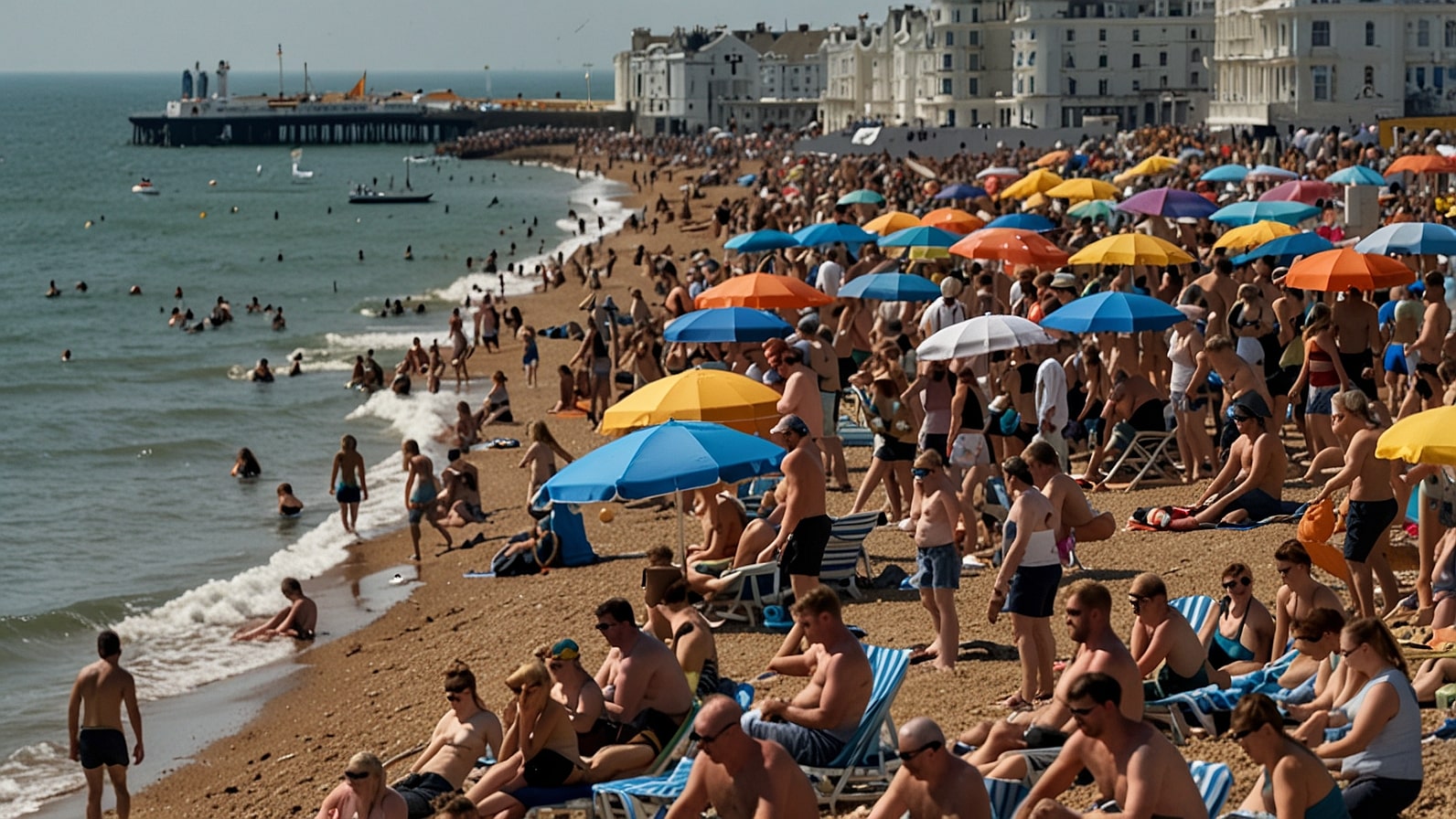In the United Kingdom, the effects of an unprecedented heatwave have been unfolding throughout August 2025, as we experienced sweltering temperatures that are likely to break records and put excessive pressure on the infrastructure of the country, the health of the population, and everyday life.
The Met Office has warned that temperatures will be in the range of 35-38 degrees Celsius across parts of southern England, the Midlands, and Wales, announcing amber weather warnings. This record heatwave is driven by a high-pressure system and warm air currents from southern Europe, forming one of the strongest heatwaves in recent British history.
Severe Weather Conditions are a New Norm for Holly
The heatwave, which was already in force earlier this week, has seen temperatures exceed the mid-30s in some parts of the country, with temperatures reaching 34.8C in London on August 1, the hottest day of the year so far.
The weather models also foresee that the mercury may even continue to increase this weekend, with some models suggesting a possibility of breaking the UK record of 38.7 °C set in July 2019 in Cambridge.
There have been several theories as to the causes of the extreme conditions, with the Met Office suggesting that it was a mixture of climate change and an unusually intensified heat dome that was trapping warm air over the area.
People across the UK are already adjusting to the insufferable weather, with people converging on beaches and parks to escape the heat. Coastal locales, such as Bournemouth and Brighton, have reported the highest number of visitors, with authorities advising people to drink water regularly and avoid overexposure to the sun.
As people are turning to the cooling option, retailers claim their cooling products are flying out of their shops, as 200 percent more fans and portable-air conditioning devices are being sold this summer than at this point last summer.
There are Increases in the Concerns of Public Health
Health officials have issued a public alert, warning that prolonged heat is hazardous, particularly for vulnerable populations, including the elderly, young children, and individuals with pre-existing medical conditions.
The UK Health Security Agency (UKHSA) has deployed a Heat Health Alert Level 3, which notifies the population about extreme temperatures, advising them to check on vulnerable persons and take special care not to fall into the effects of heatstroke and dehydration.
LONDON: Hospitals in London and other major cities have seen a rise in heat-related illnesses, including heat exhaustion and sunburn, with emergency units anticipating a surge in cases over the weekend.
Public health expert at the UKHSA, Emily Carter, pointed out that it is imperative to remain cool and drink plenty of fluids. Such a high level of heat is unhealthy, as it causes suffering, especially among those who are not accustomed to it.
We are advising them to remain in shaded areas, take lots of wate,r and also avoid doing strenuous work during the peak hours of the day.” The agency has also disseminated information to care homes and schools, recommending that they ensure their indoor areas are well-ventilated and that staff pay attention to individuals and their physical well-being to identify when they are not feeling well.
Squeezed Infrastructure
The heatwave is straining the infrastructure of the UK, and transport systems and power supply are already being challenged. There have already been delays on several routes because of overheated tracks; speed limitations have been put on lines in southern England to avoid buckling.
Severe weather followed by warnings of capacity hiccups on the London Underground have resulted in commuters experiencing complications on the Underground, with some stations recording temperatures over 30 degrees Celsius, and transport authorities have distributed free water bottles at strategic stations.
The energy suppliers are also struggling to meet the rising demand as households and businesses turn on air conditioning and refrigeration systems. National Grid has promised that there is no problem with the energy supply, but it has urged customers to minimize their non-essential consumption of energy during peak periods.
In some rural areas, water scarcity has resulted from excessive demand, prompting water companies to appeal to residents to limit non-essential water use, such as garden sprinklers.
Economic and Ecological Problems
The extended warm weather is added to the worries about drought, especially in the south east of England, where the levels in the reservoirs are already lower than average after a chilly spring. Due to heavy rains, farmers are complaining of total crop damage, and wheat and barley yields are likely to decrease by 20 per cent in some parts.
The National Farmers Union has urged the government to support agricultural communities to mitigate the financial strain they are facing. Additionally, it is noted that food prices may continue to rise in the event of the heatwave.
Environmentalists have also jumped on the heatwave as one of the effects of climate change. Protesters in organizations such as Extinction Rebellion have held peaceful protests in the city of London, as they demand that necessary measures be taken to minimize carbon emissions.
The group has also blamed the heatwave not as a one-off but as an indication of what could happen if action is not taken now. The government has once again pledged its commitment to net-zero targets, but some critics argue that there is a need to consider short-term measures to counter the increasing incidence of extreme weather events.
Adaptation and Localized Reaction
Still, communities around the country are supporting each other. Nearly one-half of all local councils have topped up on their cooling centers in libraries and community places of assembly where people are getting some reprieve, particularly those folks with no access to air conditioning. In areas such as Manchester and Birmingham, volunteers are handing out water and sunscreen to homeless people, who are especially at risk of heat.
The topic of the heatwave is on everyone’s mind on social media sites such as X, where people are sharing ways to keep the heat at bay and raising fears about the effects of global warming.
The hashtag #UKHeatwave2025 has been trending hot with posts being both humorous about excessive sweating in the heat and cheerless explanations of the reasons it happened and what can and should be done about the environment. The attitude of the people explains resiliency and the sense of understanding that long-term strategies for extreme weather are necessary.
Looking Ahead
The Met Office has warned that the current hot spell may last up to next week, with a possible weather change that will see cooler air and showers beginning to appear. As of now, the country is on a state of alert and the authorities advocate for everyone to be cautious in terms of the protection of public health and lives.
An example of how a warmer climate causes problems affecting our daily lives was the heat wave of August 2025. The event underscores the urgency of having functional infrastructure, active population protection systems, and a reaffirmed priority to addressing climate change, as the country experiences record-high temperatures.
As the current weather situation stands, Britons are trying to stay calm and carry on, hoping that the heatwave conditions can be overcome in one way or another. However, the effects of the heatwave will reverberate far and wide even after the weather improves.



